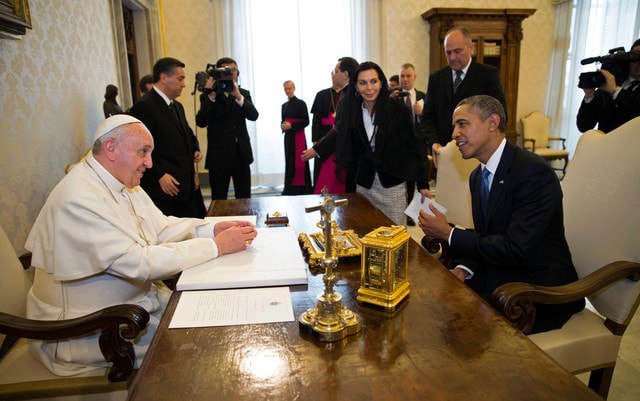US-Cuba normalization of relations: The mark of Pope Francis
(Baonghean) - In these cold Christmas days, the normalization of relations between the US and Cuba is something that could not be warmer. Because after more than half a century of embargoes, more than anyone else, the people of the beautiful Caribbean island nation understand the deprivation in all aspects that statistics can never fully express. The normalization of relations, in addition to the awareness of the highest leaders of the two countries, also has the tireless efforts of the respected Pope from the Latin American region - Pope Francis.
| RELATED NEWS |
|---|
 |
| President Obama (right) meets with Pope Francis on March 27, 2014 at the Vatican. |
Pope Francis was born Jorge Bergoglio on December 17, 1936 in Buenos Aires, Argentina, to five Italian immigrants. After studying at the Villa Devoto Seminary, he joined the Society of Jesus (also known as the Society of Jesus, a major Catholic religious order) on March 11, 1958 and began studying theology after earning a master's degree in chemistry from the University of Buenos Aires. He also completed a bachelor's degree in philosophy at the Maximo San José University in San Miguel in 1963, and then taught literature and psychology at the Inmaculada College in Santa Fe and Salvador in Buenos Aires.
For a time he worked as a bouncer in a bar, a floor cleaner and a chemical experimenter. He became a priest in 1969 and later held various roles in the Church. From 1998 he became Archbishop of Buenos Aires. In 2001, Pope John Paul II appointed him a Cardinal. On March 13, 2013, he was elected Pope in the Conclave of Cardinals after Pope Benedict XVI resigned on February 28. Born in Argentina, he is the first Pope from Latin America.
Pope Francis is considered a humble and simple person, he is always interested in the poor and is willing to dialogue with community groups of different ideologies, backgrounds and beliefs. After being elected Pope, he showed a simpler style in his daily work, for example, he chose to live in the Casa Santa Marta (a Vatican guesthouse), instead of choosing the apartment reserved for the Pope in the Basilica; he wears simpler vestments and refuses to wear the traditional colorful robes reserved for the Pope. Although he has only just become the leader of the Catholic Church, for two consecutive years (2013 and 2014), he was ranked 4th among the most powerful people in the world by the prestigious magazine Forbes. Time magazine voted him the person of the year in 2013.
Back to the event of the US and Cuba normalizing relations. As we know, since the US imposed sanctions for more than half a century, it has caused damage to the Cuban economy of 1,100 billion USD, but the losses do not stop at macro numbers, but also include many shortages in life. Among them, we can mention agricultural production, with a country that has all the conditions to develop a strong agriculture such as climate and soil, but up to now, Cuba is still a country that has to import 60% to 65% of food to serve domestic needs.
Obviously, this is a paradox, the cause of which is none other than the impact of the embargo; or like the tourism industry, many American citizens wish to visit the beautiful island nation of Cuba, only 180 km away by sea, for sightseeing and exploration, but in the past, due to travel restrictions, they had to put aside this legitimate desire... and there are many other disadvantages that cannot be fully described due to the US imposing sanctions.
Finally, after the tireless efforts of the Cuban people, the international community and the "brave" decision of US President Barack Obama, a truly meaningful gift has been delivered in the last days of 2014. A gift that not only the Cuban people, but also many American people and peace-loving people around the world are happy about, because people have been waiting for more than half a century. Although to reach the final destination as desired by the international community and President Obama himself is still a long and thorny road, because there are still two houses of the US Congress in the hands of the Republican Party with a hard-line policy towards its neighbor. But anyway, the removal of the embargo will open a new chapter in the US-Cuba relationship and will help Cuba integrate more deeply with countries in the Western Hemisphere and around the world. This is even more meaningful when knowing that the role of the third party is the Vatican and Pope Francis.
As we know, from the very beginning of the crisis, the Vatican has always been an important intermediary channel with the desire to "thaw" this relationship. But only when a Latin American is the highest leader in the Holy See like Pope Francis, with his tireless efforts and prestige, has he achieved what many people expected. He was the one who wrote the letter urging the two sides to resolve their differences and this is considered the turning point of the secret meeting between the two delegations of the US and Cuba, and then the two sides reached a consensus on normalizing the most complicated and persistent relationship in the history of the modern world. These days, in the atmosphere of Christmas and welcoming the New Year everywhere, the gift that Pope Francis gave to the Cuban people becomes even more meaningful. Hopefully, with his kindness and generosity, Pope Francis will continue to make more important contributions to "thawing" many complex "traditional" and newly emerging relationships around the world.
South Scene






